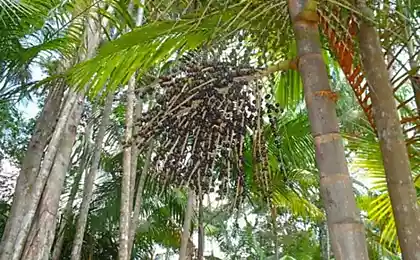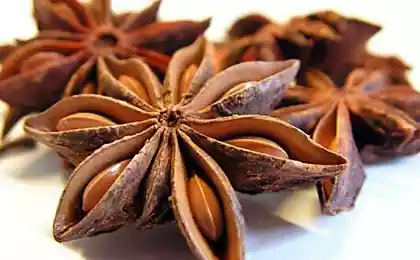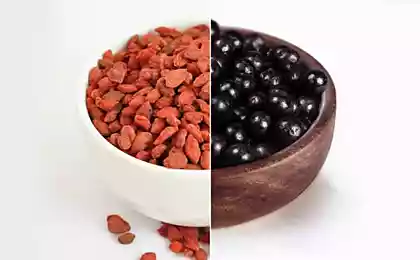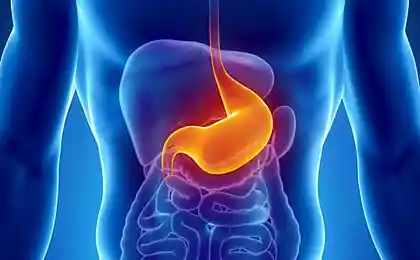481
Cough and improves digestion anise
When stomach pain and colds accompanied by a cough, a few SIPS of water with anise immediately improve health. Anise is a modest herb that is valued for its aromatic seeds which are the spice. They are used not only in cooking but also in medicine. Botany include anise to the family Apiaceae and genus Pimpinella. Its scientific name is Pimpinella anisum. This spice originates from the Middle East and the Mediterranean. I believe that originally it grew in Egypt. Like discussed earlier walnut nutmeg, anise promotes healthy digestion.
Anise is a herbaceous plant, which is a lot of interesting things written on the pages of the online Nutrition And You. In July, it blooms white, shaped like umbrellas, flowers. Collect it, cutting off the entire plant as soon as ripe seeds. Then the seeds by threshing, separated from the flower heads.

Anise seeds have a sweet aromatic bouquet. This anise flavor provided by him contained essential oil — anethole.
There is also star anise (anise star). This evergreen tree originates from China. Its fruit and seeds are also used as seasonings.
Benefits of anise health
Exotic anise spice contains some important chemical compounds of plant origin, known for its antioxidant properties, ability to prevent disease and improve health.
The main component that gives the characteristic flavor of anise is anethole — essential volatile oil contained in its seeds. Other important compounds found in the seeds of anise — estragole, p-anisaldehyde (anisic aldehyde), anise alcohol, acetophenone, pinene and limonene.
The seed oil of anise is obtained from their extract. It has application in many traditional medicines as a digestive, improves digestion, antiseptic, protivoyuznogo, carminative, expectorant, stimulant and tonic.
Anise seeds are an excellent source of many B-complex vitamins — pyridoxine, nicotinic acid, and thiamine Riboflavin. Pyridoxine (vitamin B-6) helps increase neurochemical levels of gamma-aminobutyric acid (GABA) in the brain.
The seeds of this spice are also an excellent source of minerals such as calcium, iron, copper, potassium, manganese, zinc and magnesium. In 100 grams of dry anise seeds contain 36.96 mg (462% of the recommended daily value of consumption) of iron. Potassium is an important component fluids of the cells and organism, helps control heart rate and blood pressure.
Copper acts as a factor that accompanies many vital enzymes, including cytochrome c oxidase and superoxidedismutase (other minerals also functioning in the role of this enzyme related factors — manganese and zinc). Copper is also needed to produce red blood cells.
In appreciable quantities anise also contains antioxidant vitamins such as C and A.
The use of anise in medicine
Anise seeds and their oil are used in many traditional medicines and are valued for their characteristic ability to play a role in health promotion and disease prevention.
Anise preparations are an excellent treatment for asthma, bronchial cough and digestive disorders like flatulence, bloating, colicky abdominal pain, nausea and dyspepsia.
Anise essential oil, 75-90% consists of anethol, and possessing observed estrogenic effect. A decoction of the seeds is often prescribed to nursing mothers to increase milk production.
Water, infused with anise seed, is considered a tool for facilitating common cold in babies.
Anise seeds in India chewed after meals to freshen breath.
Despite all the wonderful properties of anise, to use drugs based on it should be only after consulting with the doctor, sensing information from the Internet only as an auxiliary and in no way without relying on her.
Nutritional value of anise seeds
In parentheses are the percentage of the daily allowance. Nutritional value is based on 100 grams of anise seeds according to information from the Ministry of agriculture of the USA published on the pages of the website Nutrition And You.
General information:
energy value 337 kcal (17%);
carbohydrates 50.02 per gram (38%);
protein — 17,60 grams (31%);
fats is 15.90 grams (79%);
fiber, part of the food — 14.6 grams (38%).
Vitamins:
folic acid (vitamin B9) — 10 micrograms (2,5%);
nicotinic acid (vitamin B3) — 3,060 milligrams (19%);
Pantothenic acid — 0,797 milligrams (16%);
pyridoxine (vitamin B6) — 0,650 milligrams (50%);
Riboflavin (vitamin B2) — 0,290 milligram (22%);
thiamine (vitamin B1) 0,340 milligrams (28%);
vitamin a, which very much is contained in dandelion — 311 international units (IU, IU) is 10.5%;
vitamin C — 21 mg (35%).
Electrolytes:
sodium 16 mg (1%);
potassium — 1441 mg (31%).
Minerals:
calcium 646 mg (65%);
copper — 0,910 milligrams (101%);
iron — milligrams of 36.96 (462%);
magnesium — 170 mg (42,5%);
manganese — 2,300 milligrams (100%);
phosphorus — 440 mg (63%);
selenium is 5.0 milligrams (9%);
zinc — 5.30 milligrams (48%).
Did you know that anise is not only improves digestion, but also soothing for colds remedy? published
P. S. And remember, only by changing their consumption — together we change the world! © Join us at Facebook , Vkontakte, Odnoklassniki
Source: hi-news.ru/science/biologiya-protivoprostudnyj-i-uluchshayushhij-pishhevarenie-anis.html























